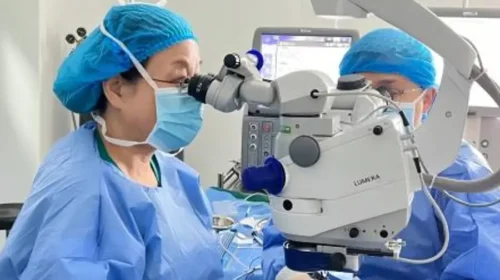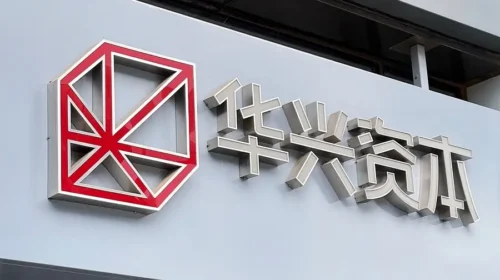Inaugural operating profit fails to lift 111 Inc.

The drug distributor expects to benefit from an ongoing crackdown on corruption in its industry due to the company’s focus on distribution to pharmacies rather than hospitals
Key Takeaways:
- 111 Inc.’s revenue fell in the first quarter from an unusually high base in the year-ago period when drug demand spiked after China ended its pandemic restrictions
- The company’s stock remains depressed, trading at a P/S ratio of just 0.05, despite reporting its first-ever operating profit in its latest quarterly report
By Doug Young
A rising tide may lift all boats, but in the current rally for U.S.-listed Chinese stocks some companies are proving heavier to lift than others. One of those is drug wholesaler 111 Inc. (YI.US), whose stock has remained stubbornly depressed despite just reporting its first-ever operating profit.
Truth be told, 111 is not exactly the sexiest company out there, and in many ways looks like traditional grocery store operators. That’s because it’s largely a middleman between drug makers and companies like hospitals and pharmacies that sell those drugs to consumers. What’s more, the company is at a relative disadvantage to older, big state-owned players like Sinopharm (1099.HK), which have long-established connections with most major drug makers and retailers.
All that said, 111 does have some relative advantages to those larger rivals. It can experiment more easily with technology due to its youth and relatively small size. In that regard, its executives talked excitedly about the many data-drive functions the company is incorporating into its services to help customers get the best prices and deliveries in the quickest times.
Another interesting advantage the company holds in the current environment is its heavy focus on selling to pharmacies, rather than the big state-owned hospitals that are well connected with established state-owned distributors like Sinopharm.
That’s created an opportunity for companies like 111, following an anti-corruption crackdown launched late last year. The source of corruption is quite well known in China and occurs largely at the hospital level, whereby drug makers bribe doctors and other hospital workers to order their products. That crackdown has continued into this year and is even deepening, said 111 Chairman Liu Junling on the company’s earnings call.
Another medical company, cancer screening device maker Burning Rock (BNR.US), last November blamed a similar crackdown in the adjacent medical devices market for a plunge in one of its main revenue sources in the third quarter.
“As a result (of the crackdown), more drug sales are expected to transition to retail pharmacies that are more accessible and transparent compared to the hospital system,” said Liu. “This transition is encouraged by the state and is poised to benefit us as we specialize in the outside hospital pharmaceutical market, where we expect huge potential and prospects.”
While such a shift should work to 111’s advantage, we have yet to see it showing up in the company’s latest earnings report. The company’s first-quarter revenue actually fell 4.6% to 3.5 billion yuan ($483 million) from 3.7 billion yuan a year earlier.
Management explained that the decline was due to an anomaly in the year-ago period that led to an unusually high number. Indeed, drugs were in huge demand in the first quarter of 2023, following China’s abrupt scrapping of its strict pandemic controls that led to a sudden spike in Covid cases. Revenue from the first quarter of 2022, which totaled 3 billion yuan, might be a better comparison, with the latest quarterly figure up about 17% from the first quarter of 2022.
Dubious milestone
While 111 trumpeted its first-ever operating profit during the quarter, it also notched a more dubious milestone when its official market value fell below its namesake figure. Specifically, the company’s market value officially fell below the $111 million mark over the past week, though we should note it’s crossed below that threshold before. The company was worth a much higher $1.2 billion at the time of its 2018 IPO when investors were still much more bullish on the big growth potential of China’s drug market.
The milestone highlights the lack of respect this company gets from investors despite its relatively large size and improving performance. Reflecting that, no major brokerages currently cover the company. It does seem to get attention from individual investors, who were present in abundance on the company’s earnings call, though it’s quite possible some or all of those were “invited” by the company to attend.
111’s stock fell 5.5% on the day it published its results last Thursday morning, and the shares are down 23% so far this year. They have staged a 20% rally from a low in late March, though they’re still trailing the rally for China stocks that has seen the broader iShares MSCI China ETF (MCHI.US) rise 25% from a low in late January.
Grocery stores and drug distributors like 111 typically get very low valuations due to their middleman role, which means they usually operate in highly competitive environments and have relatively little to offer in terms of value-added services.
The company currently trades at an extremely low price-to-sales (P/S) ratio of just 0.05, which looks quite undervalued. Sinopharm isn’t exactly a superstar either with a P/S of 0.10, though that’s still twice 111’s ratio. Domestic online grocer Dingdong (DDL.US) trades at a similarly anemic but also higher P/S of 0.16, while U.S. grocery giant Kroger (KR.US) is the “king” of this lowly valued group with a ratio of 0.26.
In the face of falling revenue, 111 was able to achieve its operating profit milestone largely by controlling costs. Its operating expenses, excluding the cost of its revenues, fell 20.6% for the quarter to 205 million yuan from 258 million yuan a year earlier. One potential place for further cost control improvement is fulfillment expenses, which were one of the company’s biggest expenses at 88.5 million yuan in the first quarter. The latest fulfillment cost was down 13.8% year-on-year, but 111 suggested it could soon come down even more rapidly with its recent rollout of a “new delivery and transit model for streamlining logistics.”
The falling costs helped the company record an operating profit of 3.7 million yuan for the quarter, versus a 21.7 million yuan operating loss a year earlier. The company continued to lose money on its bottom line, posting a net loss of 13.8 million yuan for the quarter, narrowing from its 31.8 million yuan loss a year earlier.
To subscribe to Bamboo Works free weekly newsletter, click here






